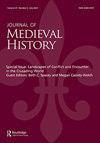Representing the mysteries of the vine: drinking wine with Gregory of Tours
IF 0.3
2区 历史学
0 MEDIEVAL & RENAISSANCE STUDIES
引用次数: 0
Abstract
ABSTRACT The literary corpus of Bishop Gregory of Tours (538–94) abounds in references to wine and vineyards. While these references have been mined by historians for insight into early medieval agriculture and commerce, comparatively scant attention has been paid to Gregory’s own complex attitude towards wine. The bishop of Tours was well aware that sin frequently accompanied an excessive desire for wine, although he took pains to insist that it was not the beverage itself that caused iniquity. As a natural by-product of Creation, wine in Gregory’s view only became problematic when valued solely for the pleasure and wealth that it could represent. Conversely, when consumed with proper gratitude towards its Creator, it could provide nourishment, pleasure and even good health. Consequently, Gregory frequently utilised wine and grapevines in his writings as symbols for God’s plenty, which nevertheless only hinted at the true pleasures to be found in Heaven.代表葡萄的奥秘:与图尔的格列高利一起喝酒
摘要图尔主教格雷戈里(538-94)的文学文集中大量提及葡萄酒和葡萄园。虽然历史学家挖掘了这些参考文献,以深入了解中世纪早期的农业和商业,但对格雷戈里自己对葡萄酒的复杂态度却相对缺乏关注。图尔主教很清楚,罪恶经常伴随着对葡萄酒的过度渴望,尽管他煞费苦心地坚称,造成罪恶的不是饮料本身。在格雷戈里看来,葡萄酒作为创造的自然副产品,只有在仅仅以其所代表的快乐和财富为价值时,它才会成为问题。相反,当对造物主心存感激时,它可以提供营养、快乐甚至健康。因此,格雷戈里在他的著作中经常使用葡萄酒和葡萄藤作为上帝富足的象征,尽管如此,这只是暗示了在天堂里可以找到真正的快乐。
本文章由计算机程序翻译,如有差异,请以英文原文为准。
求助全文
约1分钟内获得全文
求助全文
来源期刊

JOURNAL OF MEDIEVAL HISTORY
MEDIEVAL & RENAISSANCE STUDIES-
CiteScore
0.60
自引率
0.00%
发文量
29
期刊介绍:
The Journal of Medieval History aims at meeting the need for a major international publication devoted to all aspects of the history of Europe in the Middle Ages. Each issue comprises around four or five articles on European history, including Britain and Ireland, between the fall of Rome and the Renaissance. The Journal also includes review articles, historiographical essays and state of research studies.
 求助内容:
求助内容: 应助结果提醒方式:
应助结果提醒方式:


